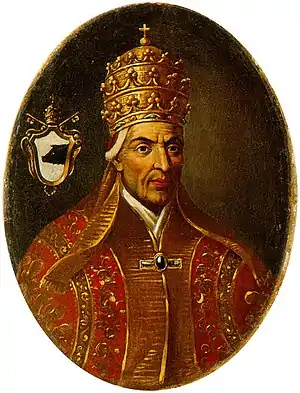1061
Year 1061 (MLXI) was a common year starting on Monday (link will display the full calendar) of the Julian calendar.
| Millennium: | 2nd millennium |
|---|---|
| Centuries: | |
| Decades: | |
| Years: |
| 1061 by topic |
|---|
| Leaders |
|
| Birth and death categories |
| Births – Deaths |
| Establishments and disestablishments categories |
| Establishments – Disestablishments |
| Gregorian calendar | 1061 MLXI |
| Ab urbe condita | 1814 |
| Armenian calendar | 510 ԹՎ ՇԺ |
| Assyrian calendar | 5811 |
| Balinese saka calendar | 982–983 |
| Bengali calendar | 468 |
| Berber calendar | 2011 |
| English Regnal year | N/A |
| Buddhist calendar | 1605 |
| Burmese calendar | 423 |
| Byzantine calendar | 6569–6570 |
| Chinese calendar | 庚子年 (Metal Rat) 3757 or 3697 — to — 辛丑年 (Metal Ox) 3758 or 3698 |
| Coptic calendar | 777–778 |
| Discordian calendar | 2227 |
| Ethiopian calendar | 1053–1054 |
| Hebrew calendar | 4821–4822 |
| Hindu calendars | |
| - Vikram Samvat | 1117–1118 |
| - Shaka Samvat | 982–983 |
| - Kali Yuga | 4161–4162 |
| Holocene calendar | 11061 |
| Igbo calendar | 61–62 |
| Iranian calendar | 439–440 |
| Islamic calendar | 452–453 |
| Japanese calendar | Kōhei 4 (康平4年) |
| Javanese calendar | 964–965 |
| Julian calendar | 1061 MLXI |
| Korean calendar | 3394 |
| Minguo calendar | 851 before ROC 民前851年 |
| Nanakshahi calendar | −407 |
| Seleucid era | 1372/1373 AG |
| Thai solar calendar | 1603–1604 |
| Tibetan calendar | 阳金鼠年 (male Iron-Rat) 1187 or 806 or 34 — to — 阴金牛年 (female Iron-Ox) 1188 or 807 or 35 |

Pope Alexander II (r. 1061–1073)
Events
Europe
- Spring – Robert de Grandmesnil, his nephew Berengar, half-sister Judith (future wife of Roger I), and eleven monks of the Abbey of Saint-Evroul, are banished by Duke William II (the Bastard) of Normandy for violence, and travel to Southern Italy.[1]
- Summer – Norman forces led by Duke Robert Guiscard and his brother Roger I invade Sicily. They land unseen during the night and surprise the Saracen army. Guiscard conquers Messina and marches into central Sicily.
- June 28 – Count Floris I is ambushed on a retreat from Zaltbommel and killed by German troops at Nederhemert. Most of West Frisia (later part of the County of Holland) is conquered and annexed by the Holy Roman Empire.
- Sosols (a tribe in Estonia) destroy the Kievan Rus' fortification of Yuryev in Tartu, and carry out a raid on Pskov.[2]
Africa
Religion
- July 27 – Pope Nicholas II dies after a 2-year pontificate at Florence. He is succeeded by Alexander II as the 156th pope of the Catholic Church in Rome.
- The Speyer Cathedral is consecrated in Speyer (modern Germany).
Births
Deaths
- January 28 – Spytihněv II, duke of Bohemia (b. 1031)
- May 5 – Humbert of Moyenmoutier, French cardinal
- June 28 – Floris I, count of Friesland (west of the Vlie)
- July 13 – Beatrice I, German abbess of Quedlinburg (b. 1037)
- July 27 – Nicholas II, pope of the Catholic Church
- Abu Sa'id Gardezi, Persian geographer and historian
- Adelmann, bishop of Brescia (approximate date)
- Ali ibn Ridwan, Arab physician and astronomer
- Burgheard, English nobleman
- Burkhard I (or Burchardus), German nobleman
- Conrad III (or Konrad III), German nobleman
- Henry I (or Heinrich I), German count palatine
- Rajaraja Narendra, Indian ruler (b. 1022)
- Rúaidhri Ua Flaithbheartaigh, king of Iar Connacht
- Song Qi, Chinese statesman and historian (b. 998)
References
- John Julius Norwich, The Normans in the South 1016–1130 (London: Solitaire Books, 1981), pp. 146–47.
- Mäesalu, Ain (2012). "Could Kedipiv in East-Slavonic Chronicles be Keava hill fort?" (PDF). Estonian Journal of Archaeology. 1: 199. Archived (PDF) from the original on October 9, 2022. Retrieved December 27, 2016.
This article is issued from Wikipedia. The text is licensed under Creative Commons - Attribution - Sharealike. Additional terms may apply for the media files.